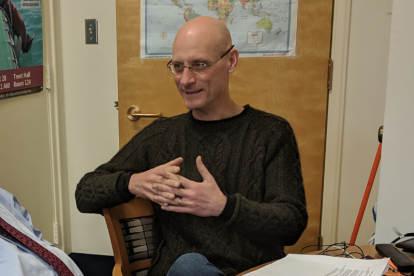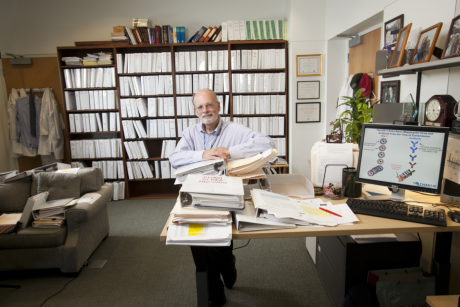
Duke Bass Connections students Kerry Mallinson and Rick Tsao are pictured in an open-air market in Malaysia. During their program there in 2018, the undergraduates — both global health majors — worked with DGHI Professor Gregory Gray testing aerosol samples in markets for viruses. (Photo by Jim Rogalski)
Published June 1, 2020, last updated on July 27, 2020 under Education News
David Boyd, always a highly ranked professor, has recently gotten a lot more popular.
Boyd, the Hymowitz Family Professor of the Practice of Global Health, teaches a Coursera course called Challenges of Global Health. Before the pandemic, some 22,000 people had taken the online course, with around 25 new students enrolling each week. But by April, signups jumped to more than 1,000 a week.
“This pandemic really piqued students’ interest in understanding global health,” Boyd says. “For the most part, they are educated professionals in various fields wanting to learn more about what’s happening in the world.”

David Boyd, the Hymowitz Family...
Boyd’s course already contained modules relevant to the current pandemic, such as a video interview about zoonotic infectious diseases with Christopher Woods, professor of medicine, global health and pathology, and he’s adding new COVID-related content.
“DGHI was very supportive of my putting this course together, with the idea that it’s a public service — introducing global health to a general audience,” he says. “All around us, in the developed and developing worlds, are educated people who want to know more about global health.”
In fact, Duke students at all levels are showing an increased interest in the field.
More undergrads are inquiring about majoring or minoring in global health. “I’ve had quite a few emails from students saying the pandemic is what sparked their interest,” says Kate Sullivan, student services coordinator at DGHI.
Even high school students who are considering Duke are contacting DGHI expressing interest in studying pandemics and COVID-19 at Duke.
DGHI’s Master of Science in Global Health program received a late surge of interest after the March 1 admission deadline, including from more than a dozen Peace Corps volunteers after the program evacuated volunteers from international placements. In response, DGHI extended its application deadline to May. “It’s like a second cycle of admissions,” says Sarah Martin, assistant director for graduate admissions.
Students Get Involved in COVID-19 Research
Among the attractions is the opportunity to work on the frontlines of the COVID-19 pandemic. Incoming global health master's student Diya Uthappa, who is finishing up her second year of medical school, is looking forward to working with Christopher Woods on a project to develop novel diagnostics to identify people infected with the coronavirus even when they don’t show symptoms.
“Having him as a mentor and going through this course of study will really help me to learn the epidemiology and biostatistics, but also to be able to translate them into work that can impact people worldwide,” Uthappa says.
Nathan Thielman, professor of medicine and director of the MSc-GH program and the Global Health Pathway for Fellows and Residents, says students and trainees are playing key roles in local research efforts to better understand the epidemiology of COVID-19 and to evaluate treatment options. “Our students are eager to learn about this new coronavirus and to mitigate its impact both in Durham and around the world.”
Fellows and residents in the Global Health Pathway Program are screening and enrolling patients in COVID-19 studies, and working on a convalescent plasma initiative to enroll and follow patients and screen potential plasma donors who have recovered from the disease.
Outside of medical research, students are involved in research led by DGHI professor Gregory Gray on the origins of zoonotic viruses and how they transfer to humans. They are studying different countries’ responses to the pandemic with policy experts such as Gavin Yamey, director of DGHI’s Center for Policy Impact in Global Health, and Jonathan Quick, an adjunct professor with DGHI who is leading an initiative at The Rockefeller Foundation to study the global response to COVID-19. More than a dozen DGHI professors are currently researching aspects of the pandemic and advising local, national and international organizations on how to respond.
“The students are seeing the faculty in practice mode,” says Lysa MacKeen, DGHI’s assistant director for experiential learning. “It’s been exciting to see how faculty engaged in this work have been reaching out and finding ways for students to become connected.”
For example, undergrads in the DGHI Student Research Training Program can’t go to India this summer to work on a long-running project on the mental health of children in group homes. Instead, they are working with Sumedha Ariely, associate professor of the practice of global health, on ways to collect mental health data virtually and to help assess how the isolation prompted by the pandemic is affecting mental health trends of the children and their caregivers.
New Summer Classes Focus on Pandemic
Students are also focusing on the pandemic in the classroom — or as of now, the Zoom room. “In response to student interest, faculty incorporated COVID-19 into all our courses in the spring, and we developed two summer courses specifically on COVID-19,” says Mary Story, associate director for academic programs at DGHI and professor of global health and family medicine and community health.
Eric Green, assistant professor of the practice of global health, is teaching Visualizing the COVID-19 Pandemic to about 30 graduate and undergraduate students. “We’re using this shared experience as a motivation to learn about data science,” he says. “There are so many charts in the news and on Twitter, so why not learn how to make them? We reproduce interesting COVID-related charts in the news and learn new data skills.”
The other new summer course, Novel Coronavirus: Epidemics and Response in the Age of Global Interdependence, is based on one taught at Duke Kunshan University in March, by Noah Pickus, associate provost at Duke and dean of undergraduate curricular affairs and faculty development at DKU, and Benjamin Anderson, assistant professor of global health at DKU. About 40 undergrads, from a variety of departments and geographic locales, are taking the course.
The DKU version had 50 students, unusual since most classes there have less than 18 students. The students were sheltering at home all across China, Japan, South Korea, New Zealand, Kazakhstan, Ethiopia and the United States. “Students would read news in Ethiopia or New Zealand or Wuhan or Colorado and then go online and have a conversation with students and faculty all over the world,” he says. “It was richer in many ways and more intense than if they’d all been at DKU.”
Dennis Clements, professor of pediatrics, community and family medicine and global health and director of undergraduate studies at DGHI, says the strong student interest in the pandemic and the quick faculty response “shows that both faculty and students are willing to take the world situation and go with it. We don’t know the outcome yet, but people are willing to get in the middle of it and try to understand it. It will be a rich experience in the long term because they are learning not from books, but from something living around them.”

